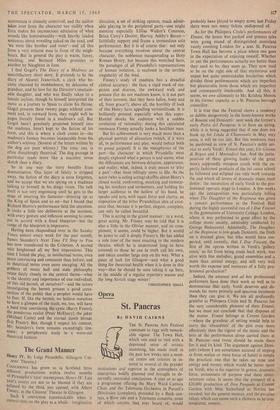The Grand Manner
COINCIDENCE has given us in Scotland three different productions within twelve months of Pirandello's 'rare' masterpiece, Henry IV. Last year's essays are not to be blamed if they are eclipsed by the third, just opened, with Albert Finney, at the Citizens' Theatre in Glasgow.
Such I conviction (unmistakable when it comes) rests on the play as a whole : imaginative direction, a set of striking aptness, much admir- able playing in the peripheral parts—one might mention especially Lillias Walker's Countess, Brian Carey's Doctor, Harvey Ashby's Baron— faithfully support and frame a tremendous solo performance. But it is of course that: not only because everything revolves about the central character, the nobleman masquerading as Holy Roman Henry, but because this wretched hero, the paradigm of all Pirandello's representations of human isolation, is enclosed in the terrible singularity of the mad.
Finney's study of madness has a dreadful clinical accuracy: the face, a rigid mask of sus- picion and distress, the awkward walk and posture (for do not madmen know, is it not part of their torment, that they have fallen, body and all, from grace?), above all, the horribly ill look of this Henry have appalling verisimilitude. It is brilliantly pointed, especially when this super- Hamlet shocks his audience with a sudden revelation of rationality; during this calculated remission Finney actually looks a healthier man.
But his achievement is very much more than a physical portrait of alienation (which, if it were all, in performance and play, would reduce both to grand guignol). It is the metaphysics of the part—the character in which Pirandello most deeply explored what a person is and seems, what the differences are between delusion, appearance, and reality, what, indeed, it truly means to 'play a part'—that most tellingly come to life. As the actor (who is acting acting) shuffles about Henry's closed world, confronting, mocking and torment- ing his mockers and tormentors, and holding his larger audience in the hollow of his hand, he speaks and acts, with equal force and clarity, an exposition of the bitter Pirandellian idea of exist- ence that, because it is perfect, elegant, complete, can only be called beautiful.
This is acting in the grand manner : in a word, great acting. Mr. Finney may be told that it is also a little in the Olivier manner, and no com- pliment, it seems, could be higher. But it would be juster to call it simply Finney's. He has added a role (one of the most exacting in the modern theatre, which he is understood long to have coveted) to those he can in truth call his own, and taken another large step on his way. What a piece of luck for Glasgow—and what a good thing for theatrical health when it is done in this way—that he should be seen taking it up here, in the middle of a regular repertory season and the long Scotch stage winter!
CHRISTOPHER SMALL


































 Previous page
Previous page